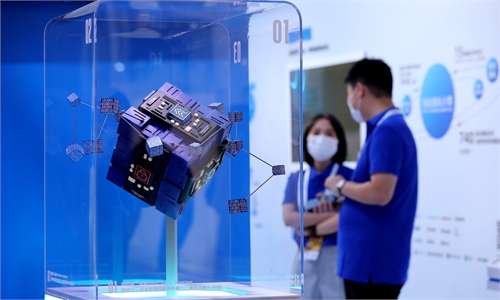US firms seek AI openings in China despite fresh bilateral tension
Foreign companies committed to Chinese market despite tension

A robot performs a massage for a visitor at the 2021 World Artificial Intelligence Conference. Photo: VCG
Even as tension between China and the US continue to escalate in a wide range of areas from trade to technology, US technological companies showed unabated passion about the Chinese market at an industry expo kicked off on Thursday in Shanghai.
Underscoring the importance of cooperation, Former US secretary of state Henry Kissinger also called on both sides to "start a dialogue" at the 2021 World Artificial Intelligence Conference (WAIC).
In a speech via video to the WAIC, Kissinger said that neither of the two countries should seek monopolies in the field of high technology and urged the two countries to opt for a relationship "of mutual benefit."
Such a message was also carried by US companies at the 2021 WAIC, where a number of US tech companies showcased their artificial intelligence (AI) solutions - Qualcomm, for example, introduced 5G applications.
Several of the companies told the Global Times that they are committed to pushing innovation and manufacturing upgrading in partnerships with Chinese companies.
Christiano Amon, president and CEO of Qualcomm, said that the company is collaborating with leading companies in China and around the world to accelerate a trend that leads to an "intelligent, cloud-connected future."
"This is a very exciting time to bring AI to its full potential in the cloud by creating more intelligent edge devices, and 5G will be the connectivity platform to connect it all. This is a massive opportunity for all of us in this industry," he said.
Ian Shih, president of US-based Rockwell Automation greater China, said that the company has established "profound" strategic partnerships with a lot of Chinese companies, including process and discrete industries.
"Today, a number of innovative technologies (in China) such as AI, big data and augmented reality have been highly integrated with our core business platforms, and we will work to accelerate the upgrading of China's manufacturing industries to enhance Chinese companies' global competence," he told the Global Times.
Those are examples of the unabated passion displayed by overseas technology giants in China's AI markets, which are No.1 in the world in terms of scale as well as investment in high-tech products, experts said.
"Opportunities in the Chinese market always exist, even at the toughest time of China-US relations. Yes, the political friction is there, but the importance of Chinese markets to US companies like Qualcomm won't be erased by external factors," independent tech analyst Fu Liang told the Global Times on Thursday.
It is not US companies alone that are holding on to China's AI market. At the WAIC, more than half of the 300-some exhibitors are companies from outside of Shanghai or from overseas countries.
Allan Gabor, president of Merck China, said in a statement the company sent to the Global Times that he sensed a revolution of AI technologies taking place in China in recent years, from voice-controlled digital assistants to drug development through machine learning, and this creates a "vibrant ecosystem" in China that the company is delighted to be part of.
"Today, 22 percent of the AI companies in the world are from China... there is no doubt that China leads the way in AI," he said. "Collaboration has been a winning strategy for us, and we are confident that we can support the strong ambitions for China to become the leading high-tech nation."
Experts also pointed to challenges standing in the way of China's AI development. For one thing, China still lags behind in basic technologies such as sensors and chips.
Also, the problem of "data fragmentation" poses risks to China-US AI cooperation, as there's no consensus on how to treat sensitive data in either country, and that increases the chances of cooperative AI projects suddenly being halted, analysts said.
On Sunday, Chinese ride-hailing app Didi Chuxing was removed from Chinese mainland app stores for new users shortly after the company went public in the US, a move that experts said arose from regulators' worry that it could leak China's big data to the US under the latter's strict requirement for information and data.




